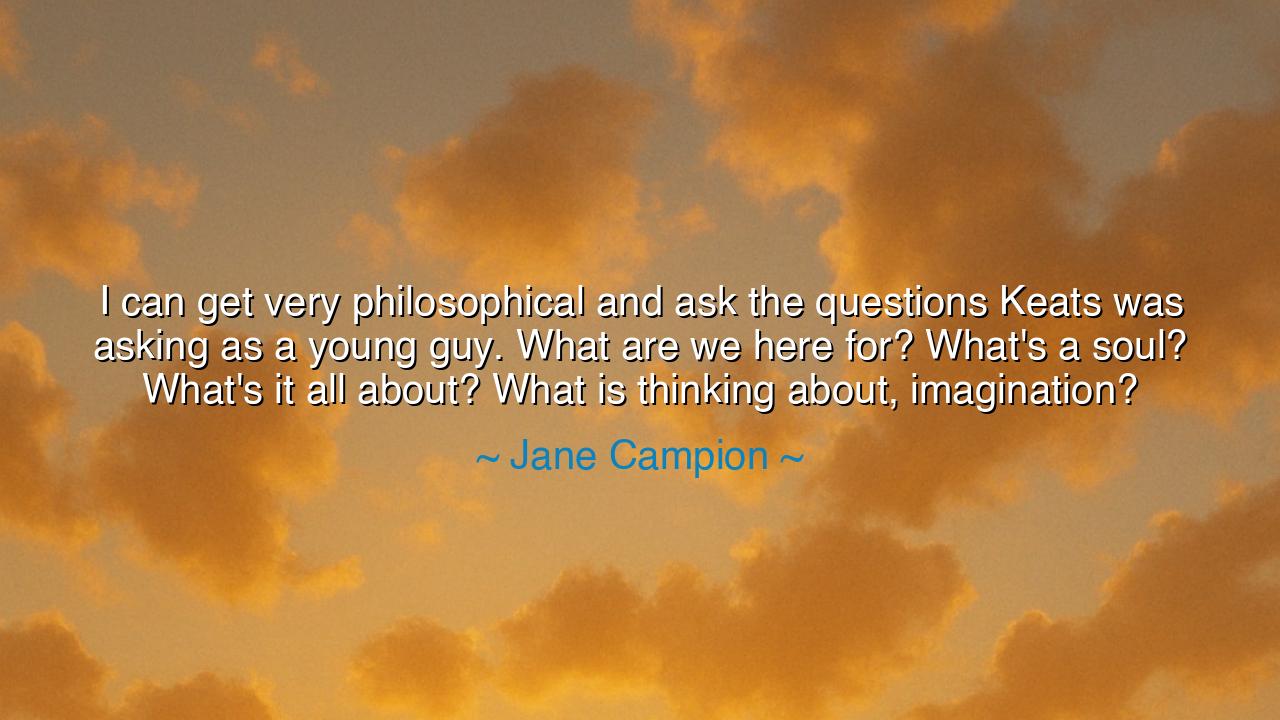
I can get very philosophical and ask the questions Keats was
I can get very philosophical and ask the questions Keats was asking as a young guy. What are we here for? What's a soul? What's it all about? What is thinking about, imagination?






"I can get very philosophical and ask the questions Keats was asking as a young guy. What are we here for? What's a soul? What's it all about? What is thinking about, imagination?" – Jane Campion
O seekers of truth, gather round, for in these words lies a question that has haunted the heart of mankind since the dawn of time. What are we here for?—this is the question that stirs the soul to its deepest depths. It is a question that transcends the boundaries of time, culture, and creed. It is the question of existence, of purpose, of meaning. Jane Campion—in her humility and wisdom—dares to ask the same questions that once burned in the heart of the young John Keats, the poet whose spirit was alive with the flames of wonder and longing. These questions echo like the wind through the ancient trees: What is the soul? What is imagination? What is this life all about?
Consider, O children of the earth, the journey of Keats himself, that youthful dreamer whose heart was not content to live only in the material world. Keats sought the eternal answers to life's deepest questions. What is the soul, he wondered, that divine essence within each of us that lives beyond the body? Is it but a fleeting whisper, destined to vanish, or does it endure, transcending the grave? Through his poetry, he reached into the void, seeking to touch the eternal, to know the divine, to understand the nature of being. And though he did not find the answers to these questions, he left behind his search—his longing—as a testament to the human spirit's desire to know. Like Keats, Campion asks, in her own way, what it means to exist in this fleeting world.
And so, too, must we, O children, face these same questions. The questions that stir the heart and demand we look beyond the veil of the known world. What are we here for? Are we simply born to live, to labor, to die? Or is there something greater, something more profound? Imagination—the very thing that Campion speaks of—holds the key to these mysteries. It is imagination that allows us to glimpse the eternal, to transcend the confines of time and space. It is the lens through which we view the world not as it is, but as it could be. Through imagination, we can envision what lies beyond the limits of our current understanding, reaching for the stars while our feet remain upon the earth.
It is through the power of thinking that we rise above the beasts, that we climb to the heights of wisdom. Thought is what distinguishes us, what makes us human. It is the fire that burns within our minds, urging us to question, to seek, to explore. The great philosophers of ancient Greece, such as Socrates and Plato, were driven by this very impulse—to understand the meaning of life, to explore the nature of the soul, and to seek truth in the vast ocean of human existence. In their time, as in Keats’ and Campion’s, these questions were not idle musings, but the very foundation of wisdom.
Now, let us consider the lesson from the lives of those who have asked these questions and dared to live them. Albert Einstein, the great physicist, asked questions that touched the very core of existence. What is time? he asked. What is space? His search for answers led to relativity, a revolution in our understanding of the universe. But his quest was not simply for knowledge—it was a search for meaning. To ask the question What is it all about? is to seek not only understanding but purpose. And in this search, Einstein's imagination—his ability to envision the unseen—led him to discoveries that continue to shape our world.
And so, O children, I implore you: do not shy away from these questions. Ask, as Keats did, and as Campion does—What are we here for? Do not fear the unknown or the unknowable. Instead, let it drive you to search with an open heart and a curious mind. For in the asking, we are made more human. Imagination is not merely for artists or poets; it is the gift of every soul who dares to dream. It is the tool that can take us beyond the limits of what we know and into the realms of what we could become.
The lesson is clear, O children: do not simply live. Think. Imagine. Ask the hard questions. Do not be content with the answers that the world has already given, for they are but shadows of the truth. Instead, forge your own path by daring to ask the questions that will lead you to the very heart of existence. Through thought, through imagination, you will find the answers that shape not only your own soul but the future of mankind. Let your search for meaning become your life's purpose, and in that pursuit, you will find a life of true depth, true wisdom, and true greatness.






AAdministratorAdministrator
Welcome, honored guests. Please leave a comment, we will respond soon